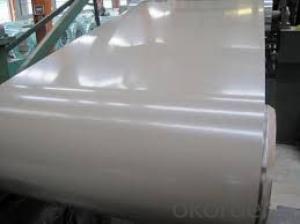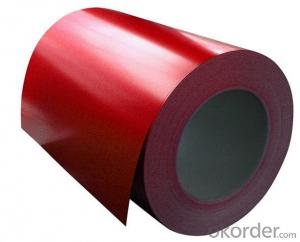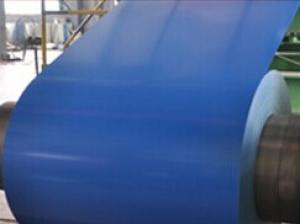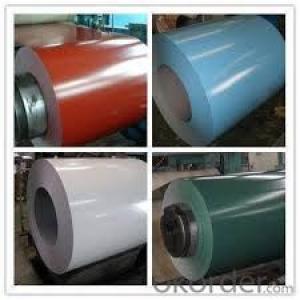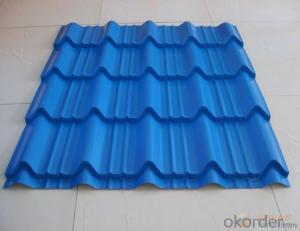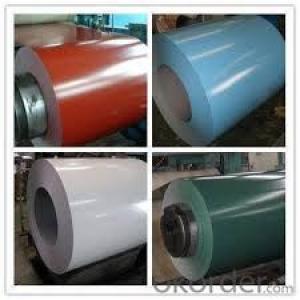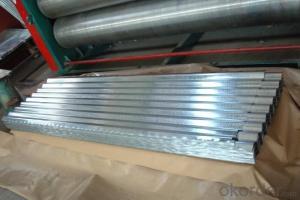Pre-Painted Galvanized/Aluzinc Steel Coil High Strength
- Loading Port:
- China main port
- Payment Terms:
- TT OR LC
- Min Order Qty:
- 50 m.t.
- Supply Capability:
- 10000 m.t./month
OKorder Service Pledge
OKorder Financial Service
You Might Also Like
1. Pre-Painted Galvanized/Aluzinc Steel Coil with Best Quality in China
With GI as base material, after pretreatment (degrease and chemical treatment ) and liquid dope with several layers of color, then after firing and cooling, finally the plate steel is called pre-painted galvanized (aluzinc) steel. Pre-painted galvanized steel is good capable of decoration, molding, corrosion resistance. It generally displays superior workability, durability and weather resistance.
2.Main Features of the Pre-Painted Galvanized/Aluzinc Steel Coil:
• Excellent process capability
• Smooth and flat surface
• Workability, durability
• Excellent heat resistance performance
• High strength
• Good formability
• Good visual effect
3.Pre-Painted Galvanized/Aluzinc Steel Coil Images

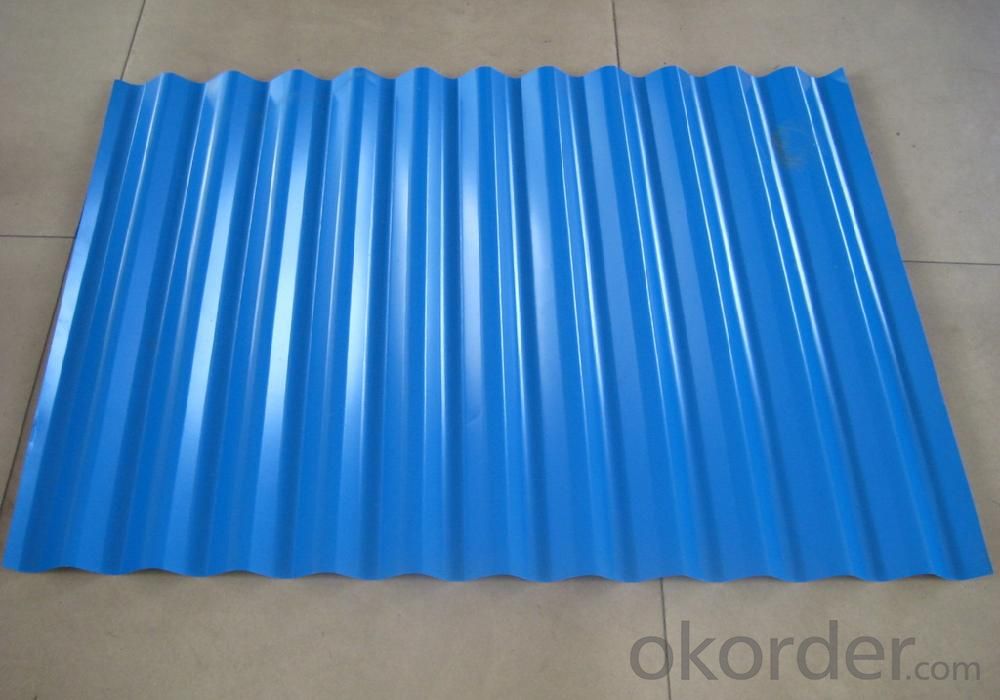
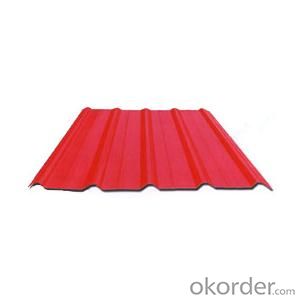
4.Pre-Painted Galvanized/Aluzinc Steel Coil Specification
Standard: AISI, ASTM, BS, DIN, GB, JIS
Grade: DX51D, DX52D
Thickness: 0.17-2.0mm
Brand Name: KMRLON
Model Number: coil
Type: Steel Coil
Technique: Cold Rolled
Surface Treatment: Coated
Application: Boiler Plate
Special Use: High-strength Steel Plate
Width: 20-1250mm
Length: customized
commoidty: pre-painted galvanized steel coil
Thickness: 0.13-4.0mm
width: 20-1250mm
zinc coating: 40-180g/m2
printing thickness: top side: 20+/-5 microns, back side: 5-7 microns
color: all RAL color
surface treatment: color coated
coil weight: 4-7 tons
coil ID: 508/610mm
packaging: standard seaworthy packing
5.FAQ of Pre-Painted Galvanized/Aluzinc Steel Coil
1. What’s the application of this product?
Roof, roof structure, surface sheet of balcony, frame of window, etc.
2. What’s the brand of the paint?
We use the best brand of all of the word—AKZO.
3. How to guarantee the quality of the products?
We have established the international advanced quality management system,every link from raw material to final product we have strict quality test;We resolutely put an end to unqualified products flowing into the market. At the same time, we will provide necessary follow-up service assurance.
4. How long can we receive the product after purchase?
Usually within thirty working days after receiving buyer’s advance payment or LC. We will arrange the factory manufacturing as soon as possible. The cargo readiness usually takes 15-25 days, but the shipment will depend on the vessel situation.
- Q: How are steel coils inspected for surface quality?
- Steel coils are inspected for surface quality through a visual examination process, where trained inspectors closely examine the surface of the coils for any defects or irregularities. This includes looking for scratches, dents, stains, or any other imperfections that may affect the quality of the steel. Additionally, advanced technologies such as automated scanning systems or cameras may also be used to detect and analyze any surface defects that are not easily visible to the naked eye.
- Q: What are they worth today? As well as a 1943 steel nickel?
- I think they are worth about a pennie.
- Q: What is the role of steel coils in the oil and gas industry?
- The oil and gas industry heavily relies on steel coils, which have a crucial role to play. These coils are primarily utilized for the transportation and storage of oil and gas products. Typically, they are crafted from high-quality steel and designed to endure the harsh conditions encountered during the extraction, processing, and distribution of oil and gas. One of the key functions of steel coils in this industry is to serve as containers for transportation purposes. Oil and gas are frequently transported over long distances, either through pipelines or tankers. Steel coils are used in the construction of these pipelines and storage tanks, providing a robust and secure means of transporting these valuable resources. The strength of steel ensures that the pipelines and storage facilities can withstand the pressure and temperature fluctuations that occur during transportation. Steel coils also play an essential role in the production of drilling equipment. The drilling process involves extracting oil and gas from deep underground reservoirs. Steel coils are employed in the manufacturing of various components of drilling rigs, including pipes, casings, and wellheads. These components must be capable of withstanding the high pressures and temperatures encountered during drilling operations. Steel coils offer the necessary strength and durability to ensure the reliability and safety of drilling equipment. Additionally, steel coils are utilized in the construction of offshore platforms, which are bases for drilling operations in offshore oilfields. The severe marine environment, characterized by saltwater exposure and strong winds, demands materials that can resist corrosion and provide structural integrity. Steel coils are used to fabricate the structural components of these offshore platforms, ensuring their ability to withstand the challenging offshore conditions. In conclusion, steel coils are indispensable in the oil and gas industry. They are employed for the transportation and storage of oil and gas products, the construction of pipelines and storage tanks, the manufacturing of drilling equipment, and the fabrication of offshore platforms. The strength, durability, and resistance to harsh conditions make steel coils an essential material in this industry.
- Q: I noticed a friend's appliances are not magnetic, and mine are. Both are stainless steel. Are there two types of stainless steel or something? Thanks
- Some stainless steel are magnetic and some aren't. The real high grade stainless steels aren't magnetic.Stainless is just regular steel with varying degrees of nickel and chromium alloys mixed in the batch. The more nickel and chromium the less likely to be magnetic. A lot of stainless exhaust pipes and barbecue grills claim to be stainless, and yet they still rust and tend to be magnetic. They must use the bare minimum of nickel and chromium in the melted batch just to claim the title of stainless steel. Nickel and chromium are quite expensive and they are what gives the steel the anti-corrosion and extreme hardness characteristics along with loss of magnetism of the steel. If you have stainless steel that is magnetic , it is a good sign it is stainless steel that barely meets the criteria of true stainless steel.
- Q: How are steel coils used in the production of industrial storage tanks?
- Steel coils are commonly used in the production of industrial storage tanks due to their superior strength and durability. These coils are typically made from high-quality steel that is rolled into a coil shape, allowing for easy transportation and handling. In the production process, steel coils are first uncoiled and flattened to create sheets of steel. These sheets are then cut and formed into the desired shape and size for the storage tank. The steel sheets are welded or bolted together to create the tank's body, which is designed to withstand high pressure and heavy loads. The use of steel coils in the production of industrial storage tanks offers several advantages. Firstly, the strength and durability of steel ensure that the tanks can withstand harsh conditions and are resistant to corrosion. This is particularly important for storage tanks that may contain corrosive substances or be exposed to harsh environments. Additionally, the flexibility of steel coils allows for customization of the tank's design and size. This is particularly beneficial in industries where storage requirements can vary significantly, such as the oil and gas industry. Steel coils can be easily cut and formed into various shapes and sizes, enabling the production of storage tanks that meet specific storage needs. Furthermore, steel coils can be easily transported and stored, making them a cost-effective choice for the production of industrial storage tanks. The coils can be efficiently transported to the manufacturing facility, reducing transportation costs and logistical complexities. Overall, steel coils play a crucial role in the production of industrial storage tanks by providing strength, durability, and customization options. Their use ensures that the tanks can safely store and protect various substances, making them essential for a wide range of industries.
- Q: What is the average shelf life of a steel coil?
- The average shelf life of a steel coil can vary depending on various factors such as the type of steel, storage conditions, and maintenance practices. However, on average, a steel coil can have a shelf life of around 6 to 12 months if stored properly in a controlled environment with suitable temperature, humidity, and protection from corrosion. Regular inspection and maintenance can extend the shelf life of a steel coil further.
- Q: How do steel coils contribute to the manufacturing of appliances?
- Steel coils are used in the manufacturing of appliances as they serve as a primary raw material for various components such as frames, panels, and structures. These coils are processed and shaped into different forms to meet the specific requirements of different appliances. Additionally, steel coils provide durability, strength, and corrosion resistance to appliances, ensuring their long lifespan and high-quality performance.
- Q: How can the quality of steel coils be ensured?
- The quality of steel coils can be ensured through various measures such as regular testing and inspection, adherence to industry standards and specifications, quality control processes during manufacturing, and certification from reputable third-party organizations. Additionally, proper handling, storage, and transportation practices play a crucial role in maintaining the quality of steel coils.
- Q: Can steel coils be used in electrical applications?
- Yes, steel coils can be used in electrical applications. Steel coils are often used as magnetic cores in transformers and inductors, which are essential components in electrical circuits. The steel used in these coils is typically a type of high-quality electrical steel that has specific magnetic properties, such as low core losses and high permeability. These properties allow the steel coils to efficiently transfer electrical energy between different components of the circuit. Additionally, steel coils can also be used in other electrical applications, such as in the construction of electric motors and generators. Overall, steel coils are widely utilized in electrical applications due to their magnetic properties and their ability to handle high currents and temperatures.
- Q: How are steel coils manufactured?
- Steel coils are manufactured through a series of processes that involve the transformation of raw materials into the final product. The manufacturing process begins with the extraction of iron ore, which is then smelted in a blast furnace to produce pig iron. The pig iron is further refined in a basic oxygen furnace to remove impurities and adjust the carbon content. Once the molten steel is obtained, it is continuously cast into large slabs or billets. These slabs are then rolled into thinner sheets or strips through a process called hot rolling. This involves passing the steel through a series of high-pressure rollers, which reduce the thickness and shape the material to the desired dimensions. During this process, the steel is also treated to improve its mechanical properties, such as strength and hardness. After hot rolling, the steel is pickled and cleaned to remove any scale or impurities on the surface. It is then cold rolled to further reduce the thickness and improve the surface finish. Cold rolling involves passing the steel through a set of rollers at room temperature, which increases its strength and dimensional accuracy. To form steel coils, the cold-rolled steel is typically wound tightly into a large coil shape. This is achieved by feeding the steel strip through a series of rollers that gradually wind it into a spiral. The coils are then typically annealed to relieve internal stresses and improve the material's formability. Finally, the steel coils are coated or treated, depending on their intended use. This can involve applying a protective coating, such as zinc or paint, to enhance corrosion resistance or providing a specific surface treatment for improved adhesion in subsequent processes. Overall, the manufacturing of steel coils is a complex process that involves several stages, including smelting, casting, hot rolling, cold rolling, coiling, and surface treatment. Each step contributes to the final product's quality and properties, ensuring that steel coils meet the required specifications for various industrial applications.
Send your message to us
Pre-Painted Galvanized/Aluzinc Steel Coil High Strength
- Loading Port:
- China main port
- Payment Terms:
- TT OR LC
- Min Order Qty:
- 50 m.t.
- Supply Capability:
- 10000 m.t./month
OKorder Service Pledge
OKorder Financial Service
Similar products
Hot products
Hot Searches
Related keywords














